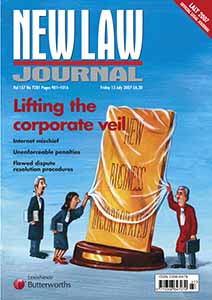
Victoria von Wachter explores how far courts will go to avoid lifting the corporate veil
Niziol v The District Law Court in Tarnobrzeg Poland [2007] EWCA Civ 596
ASM Shipping Ltd v Harris and others [2007] EWHC 1513 (Comm), [2007] All ER (D) 364 (Jun)
Public authorities should have a duty of care to parents as well as children in suspected child abuse cases, says Seamus Burns
Contour Homes Ltd v Rowen [2007] All ER (D) 310 (Jun)
AF Noonan (Architectural Practice) Ltd v Bournemouth & Boscombe Athletic Community Football Club Ltd [2007] All ER (D) 10 (Jul)
In brief
tenants: the right to know >>
Domestic violence warrants live >>
Without prejudice proximity test >>
fatter cats >>
Family blues >>
How can IT litigators fight back against anonymous e-commerce wrongdoers? Andrew Horrocks and Jack Cundy investigate
Ewing v Davis [unreported 2 July 2007]
MOVERS & SHAKERS

Jurit LLP—Caroline Williams
Private wealth and tax team welcomes cross-border specialist as consultant
.tmb-mov69x69.jpg?sfvrsn=961ae4db_1)
HFW—Simon Petch
Global shipping practice expands with experienced ship finance partner hire
95ca96e3d47f4eff8d147c4f0df17c77.tmb-mov69x69.png?sfvrsn=3db5d86b_1)
Freeths—Richard Lockhart
Infrastructure specialist joins as partner in Glasgow office






